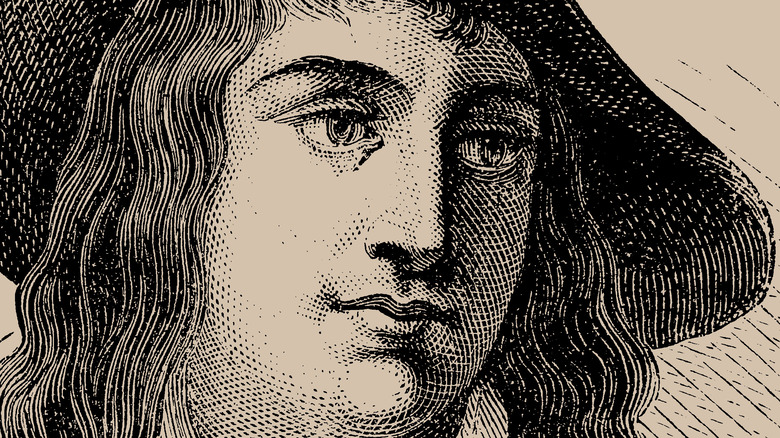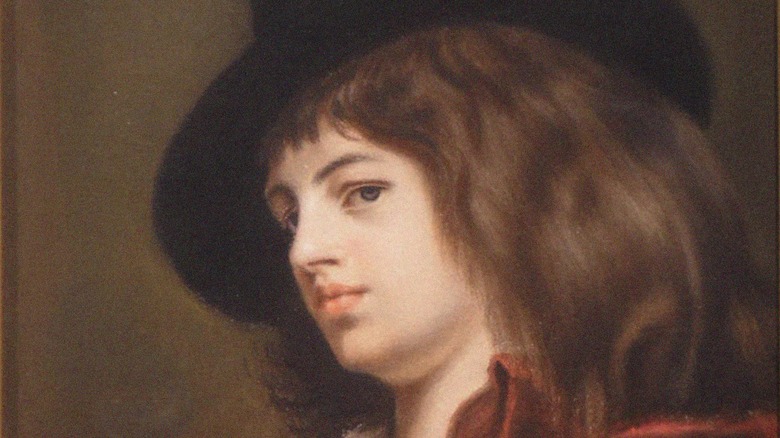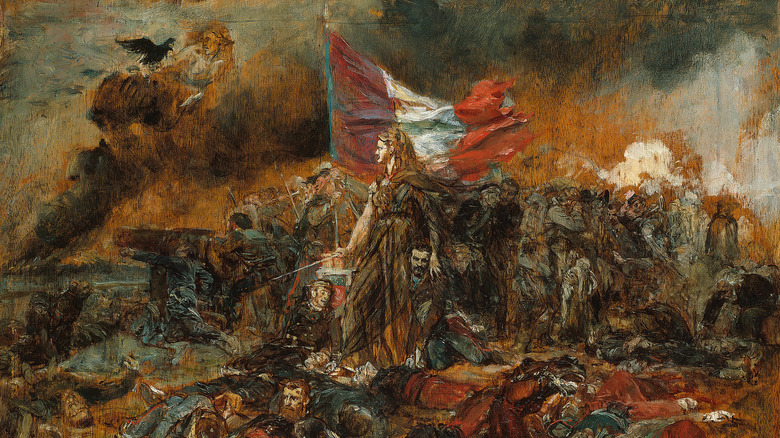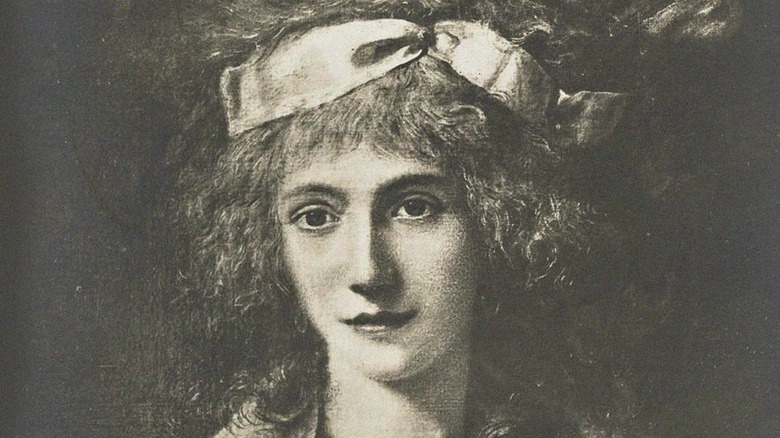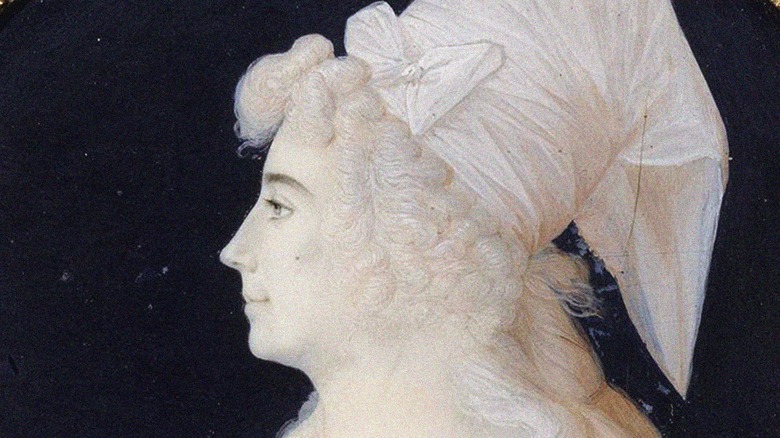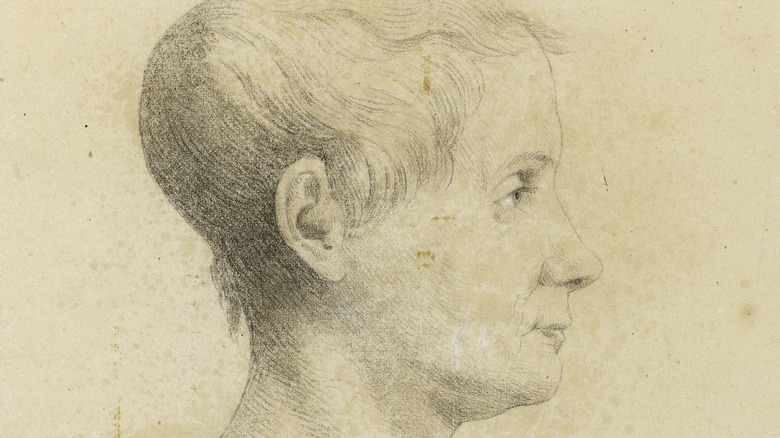How One Belgian Singer Became A Key Figure In The French Revolution
Much like the American Revolution, the French Revolution, dating roughly from 1787 through 1799, was a pivotal point in history. During this period, many still emerging notions about human liberty and social equality were put to the test, as Britannica explains. Through the uprising, the names of such men as Maximilien de Robespierre are now immortal, according to History. One lesser known but otherwise just as important figure was a woman named Anne-Josèphe Théroigne, later known as Théroigne de Méricourt.
Little is known about the early life of Théroigne, compared to other important players in the Revolution of 1789, as the French Revolution is sometimes called. (Fans of the 2014 video game "Assassin's Creed Unity," which is set in the time of the French uprising, may have played her as a character, according to The Conversation.) Such is often the case when important women from history have their stories obscured by the lives of men. Nonetheless, Anne-Josèphe Théroigne, who met a sad end, contributed much to the French Revolution. Her voice urging social equality for women outlined a societal vision which we continue to work toward today.
Théroigne's mother died when she was just 5 years old
Anne-Josèphe Théroigne had a difficult childhood. Born in 1762 in Liège, a French-speaking region of modern Belgium, Théroigne's mother died when she was young, and as a result, Anne-Joseph spent time living with her aunt and her father, who both treated her poorly. After a series of traumatic events, Théroigne was taken in by one Madame Colbert as a governess, where she also received singing lessons. As a student, Théroigne sang in some of Europe's most well-known music capitals, according to "A Woman of the Revolution, Théroigne de Méricourt" a 1911 biography written by Frank Hamel. While living in London in the home of Madame Colbert, Théroigne was taken to France by an Englishman. He at first tried to elope with Théroigne while she was only a teenager. When she refused, he took her by force.
Though they never married, she maintained a relationship with this man until he abandoned her and moved back to England. After this point, Théroigne may have even been involved in a romantic relationship with another, much older, man while living in Paris. The exact nature of this relationship is unknown. It's also believed during this period she worked as a courtesan under the alias Mademoiselle Campinado, a period term sometimes equating to sex work. All throughout, Théroigne continued her vocal training, which brought her to Rome. By 1789, Théroigne returned to France.
Théroigne was in Paris for the revolution
Théroigne was quickly involved in the revolution once she returned to Paris, inspired to speak out on behalf of the rights of women. During this time, she spent time in both Paris and Versailles as she lobbied political figures. She also participated in meetings of the National Assembly, something like the governing body for the so-called Third Estate, a term used in France at the time for the majority of French citizens that the revolution was said to represent. The term included the common worker, but also capitalist classes and the clergy, as Britannica notes. From there, the exact nature of Théroigne's whereabouts are lost to history. Some claim she fought at Versailles while dressed as a man, although that likely didn't happen, according to The Conversation.
It is known, though, that Théroigne was involved in the Women's March of Versailles in October of 1789, although her exact contributions are unknown. Théroigne also continued to work tirelessly for women's voices to be valued in the rhetoric of the revolution, and that women were given an opportunity to contribute, according to "Théroigne de Méricourt: une femme mélancolique sous la Révolution" a French Théroigne biography by Elisabeth Roudinesco published in 1989. These were not widely shared values, unfortunately, among other French revolutionaries. As time went on, the tone with which Théroigne was discussed began to shift, as Amazing Women in History explains.
The pro-royalist press turned on Théroigne
Soon, Théroigne was maligned in the anti-revolutionary press of the time for sexual promiscuity, among other gender-related allegations, as The Conversation explains. All a woman could possibly offer to the revolution was her body, as the nature of discourse surrounding Théroigne became focused. Also at this point, "de Méricourt" was appended to her name, implying a noble upbringing on her part, which she did not dispute. This upper-class characterization of Théroigne did not endear her to fellow revolutionaries, either. Nor did it well represent the social justice values of the revolution, if one of its own came from the strata of society the revolution wished to abolish, per Roudinesco's book, "Théroigne de Méricourt."
Eventually, Théroigne returned to Belgium. She was out of money and had few other options. In an attempt to quell similar revolutionary sentiments within the borders of Austria and Belgium, a warrant was issued by the Austrian government for Théroigne's arrest. Once in custody, she was transported to Austria. There, interrogators found her to be unwell and that much of her role in the French Revolution was overstated in the counter-revolutionary French press, per the Théroigne entry in the 1911 edition of The Encyclopædia Britannica. Eventually, Théroigne was released by the Austrian authorities, due in part to her declining health. After that, Théroigne returned to France, where the revolution continued.
The campaign for women's rights continued
After returning to France, Théroigne was greeted as a hero by her fellow revolutionaries for the brave stand she took while imprisoned in Austria, according to Hamel's biography "A Woman of the Revolution." A series of wars broke out during this time between France and her neighboring countries, including Austria, per Britannica. Once war broke out, Théroigne campaigned unsuccessfully for a woman's right to bear arms. She's also known in this period to have killed loyalists, dressed in extravagant style, and won the so-called "civic crown" for her bravery, according to Amazing Women in History. By August of 1792, King Louis XVI and his Queen Marie Antoinette were imprisoned, and by 1793 they were dead, according to History.
With that, the French Republic was established and the revolution was over, or so many thought. It was then that in-fighting began between former revolutionary factions, such as the Jacobins, widely considered the most radical of all revolutionary factions in France, with which Robespierre was aligned (via Britannica). At that point, there was also the somewhat more conservative Girondins, with whom Théroigne was more sympathetic, as Britannica also explains This divide would prove insurmountable and would lead to Théroigne's downfall.
Théroigne died in an asylum
Despite the inter-factional conflict that arose between the Jacobins and the Girondins once the French Republic was established, Théroigne continued to campaign for better female representation in the French government. Sadly, disagreements between the Jacobins and Girondins reached a fever pitch by spring of 1793, and Théroigne was attacked in humiliating fashion by Jacobin activists in front of the National Convention, per The Conversation. From this point, Théroigne's physical and mental health declined rapidly. The very next year she was institutionalized with symptoms of what might be diagnosed today as dementia.
Théroigne's illness, though, was misattributed in her time to the excesses of revolution and the ill effects of feminist thinking. Institutionalized, Théroigne died in 1817 at the age of 54. A biographer described her at that point as a "blotched, livid, and fleshless creature ... whose great love had not been lavished upon a man or upon men, but upon an idea, the passion for justice, for liberty — for the Revolution," according to Amazing Women in History. And with that an important chapter and an influential but otherwise lesser-known figure in history's arc toward justice came to an end. The impact of Anne-Josèphe Théroigne, though, lives on.
